2646
How Saudi Legal Consultancies Are Revolutionizing Client Service Through Odoo Workflow Management
5 min read
2646
5 min read
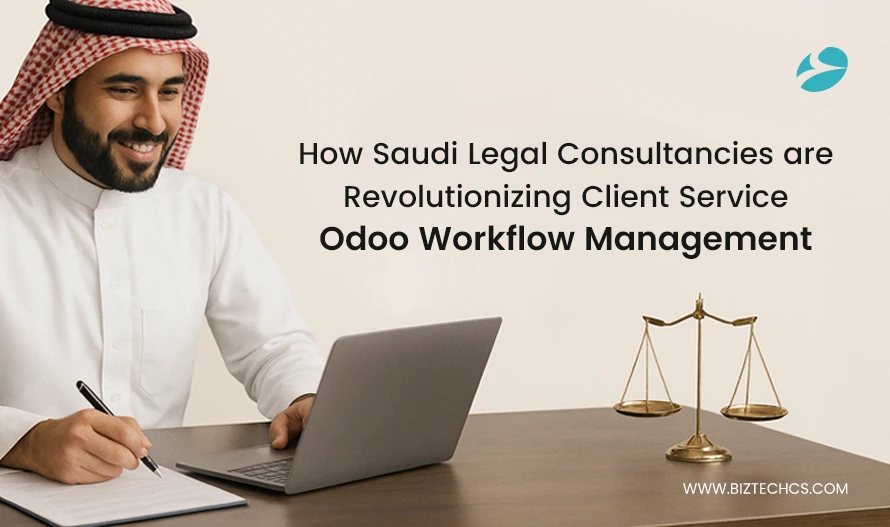
The conference room at one of the reputed law firms in Saudi fell silent as the Managing Partner reviewed the client’s simple request: “Please provide a timeline showing all approvals for our merger advisory work over the past six months.”
What should have been a five-minute task turned into a two-week scramble through email chains, draft folders, and individual lawyer notebooks. Junior associates had opened matters without partner oversight. Engagement letters floated between personal drives. Legal memos carried no approval timestamps.
“We don’t track approvals centrally,” the Managing Partner finally admitted to the client—a moment that crystallized years of operational drift.
This Riyadh-based firm was not alone. Across the industry, 79% of corporate legal departments report rising matter volumes, while 58% face flat or even shrinking budgets—creating intense pressure for efficiency and centralized processes.
The breakthrough moment came when BiztechCS was consulted to review the firm’s operational bottlenecks. Rather than focusing only on the missing timelines, we asked a broader, transformative question: “Can you audit approval logs across clients, lawyers, and document types in one centralized system?”
That conversation launched what would become a complete Odoo legal workflow management revolution.
Fragmented operations can create a false sense of efficiency, but in reality, they lead to confusion, delays, and missed opportunities.
Each lawyer at the firm operated like a mini-practice within the larger brand. Senior partners maintained personal client relationships through WhatsApp. Associates tracked deadlines in individual calendars. Document versions multiplied across email threads with no single source of truth.
The symptoms were everywhere:
“We work like five individual firms inside one brand,” observed a senior partner during our initial assessment.
This is where BiztechCS can offer a crucial insight: Law firms often confuse individual lawyer autonomy with operational flexibility. True agility comes from structured workflows that free lawyers to focus on legal expertise rather than administrative coordination.
Saudi Arabia’s evolving legal landscape demands unprecedented operational transparency. The Saudi Organization for Certified Public Accountants (SOCPA) guidelines require detailed audit trails. ZATCA e-invoicing mandates link billing to documented service delivery.
Yet this firm—like many across the Kingdom—was building compliance on operational quicksand. As BiztechCS asked during our assessment: “Are your legal workflows audit-ready, or would a regulatory review expose approval gaps that could impact client confidence?”
According to data, 47% of companies with over 1,000 employees had adopted workflow management systems by 2023 (scoop.market.us). This underscores the growing recognition that integrated workflows are essential for reducing compliance risks and accelerating regulatory responsiveness.
Ready to explore how structured workflows could transform your firm’s operational confidence? BiztechCS helps legal practices discover their path to seamless compliance without sacrificing the personal touch that wins clients.
To transform legal operations, we focused on establishing a clear, organized approach that would streamline every stage of case management and eliminate unnecessary complexity.
BiztechCS can begin with a fundamental question: ‘What if every legal matter followed a predictable path from intake to completion?’
We deployed Odoo legal case management tailored specifically for the firm’s three core practice areas:
Each case type received structured task stages with built-in approval gates. No legal memo could reach clients without partner review. No engagement letter could be issued without fee structure validation.
Here’s where BiztechCS brought our years of legal practice experience to bear: Lawyers do not resist structure—they resist overhead that does not add value. The key is designing workflows that feel enabling rather than restrictive.
The Managing Partner’s concern was immediate: “Can I restrict document issuance until I’ve personally reviewed each output?” Yes, BiztechCS can configure approval-required stages with automated notifications:
When a junior lawyer completes a legal memorandum, the system automatically routes it to the appropriate senior associate. No emails. No lost drafts. No assumptions about who saw what, and when.
Odoo Consultant Tip: This transformation can prompt BiztechCS to ask the broader question that every firm should consider: ‘Does your current system guarantee that client-facing documents reflect your firm’s quality standards, or do pieces slip through approval cracks?’
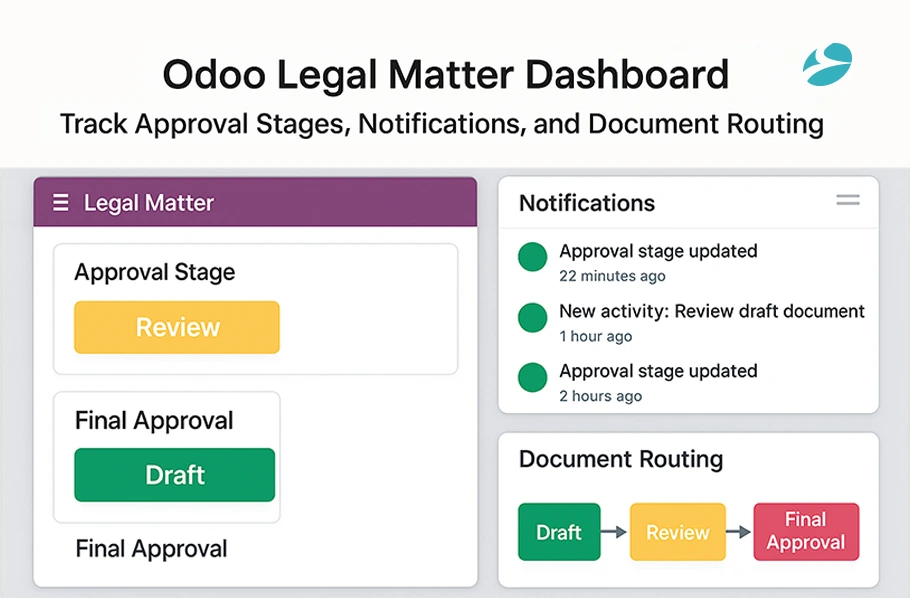
Three weeks into Phase 1, the Managing Partner shared a telling observation: “For the first time, I can see every active matter across all lawyers on one screen. I know what’s moving, what’s stuck, and where my attention is needed most.”
Client confidence followed operational confidence. When high-value clients requested status updates, the firm could provide real-time visibility rather than promises to “check and get back to you.”
Curious about how your firm’s current workflow stacks against modern practice management standards? BiztechCS offers workflow assessments that reveal both immediate wins and strategic opportunities for operational excellence.
In this phase, we shift from manual document management to a smarter, more efficient system where every document not only serves its purpose but actively drives workflow.
Traditional legal document creation resembled digital archaeology—hunting through folders for the ‘latest version’ of templates, manually tracking revisions, hoping the right approvals were secured somewhere in email history.
BiztechCS can transform document creation through Odoo document approval trail integration,
Template Library: Standardized NDAs, engagement letters, legal memoranda, and compliance reports—all linked to appropriate matter types.
Version Control: Every edit tracked with editor identification and timestamp.
Approval Logging: Digital signatures and approval actions stored as searchable system records.
Here’s where Odoo workflow optimization for law firms became transformative. Documents are no longer just files—they have become intelligent workflow assets.
When a lawyer creates an engagement letter, the system,
This is where BiztechCS can demonstrate that the most powerful legal technology isn’t complex AI—it’s simple connections between related information that eliminate redundant data entry and reduce human error.
Odoo Consultant Tip: When setting up legal templates in Odoo, always link fields dynamically to matter records. This ensures that updates in client details, fee structures, or compliance parameters automatically flow into documents—avoiding inconsistencies across multiple files.
During a complex merger advisory engagement, the client requested all supporting documentation with approval histories. Previously, this would have meant weeks of email archaeology and manual compilation.
With the new system, the request was fulfilled in 47 minutes:
The BiztechCS team can use this moment to validate the entire approach. As we demonstrated the system’s capabilities, we posed the critical question every legal firm should be able to answer: “Can your firm produce a complete matter history—including all approvals and document versions—within an hour of client request?”
Wondering how document intelligence could streamline your firm’s client service delivery? BiztechCS specializes in legal workflow transformations that turn administrative burden into competitive advantage.
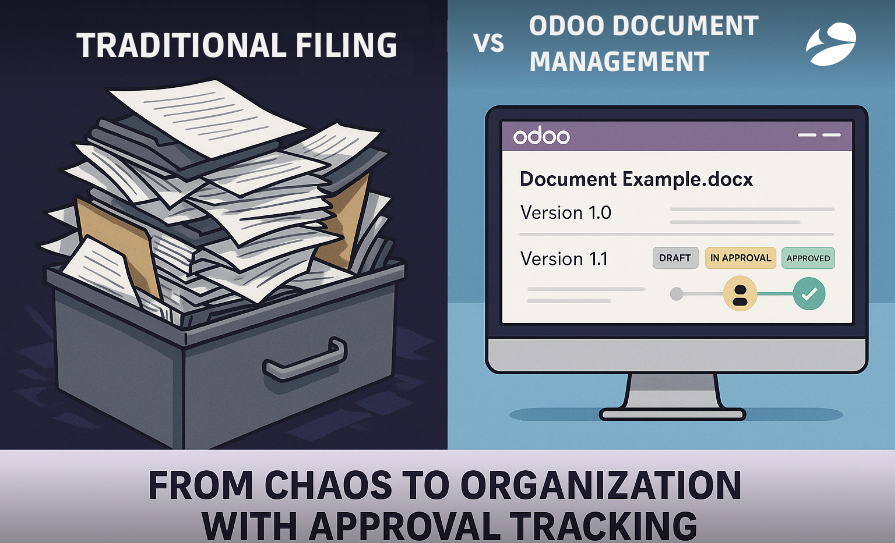
By bridging the gap between legal and financial teams, Odoo’s integration streamlines billing, ensuring transparency and compliance with Saudi Arabia’s ZATCA e-invoicing regulations.
Saudi Arabia’s ZATCA e-invoicing requirements created a perfect storm for firms with disconnected operations. Finance teams needed detailed service descriptions. Legal teams worked in billable hour abstractions. Clients demanded transparent fee structures.
The traditional approach: Finance chases lawyers for billing details after work completion, creating tension between client service and revenue recognition.
BiztechCS will consider this the perfect opportunity to demonstrate how Odoo legal consultancy services integration could eliminate this friction entirely.
BiztechCS can configure automatic invoice triggers based on matter completion,
Each invoice includes,
BiztechCS has proven a fundamental principle: The best legal technology doesn’t just automate existing processes—it creates new connections between service delivery and business operations that weren’t possible before.
Odoo Consultant Tip: For ZATCA compliance, configure Odoo’s automated invoice sequencing and QR code generation from day one. Retroactive compliance fixes are far costlier and riskier—getting it right during setup ensures audit-readiness without rework.
ZATCA compliance became a catalyst for operational excellence. When every invoice required documented service delivery, the firm naturally improved:
This transformation led BiztechCS to challenge every firm we work with: “Does your current billing process support or undermine client confidence in your service delivery and fee transparency?”
“Finally, our invoices align with legal output rather than guesswork,” noted the Finance Director six weeks into the new system. “We’re not chasing lawyers for billing details—the system provides them automatically when matters close properly.”
Client payment times improved by 28% as detailed, approval-backed invoices reduced payment delays and disputes.
Ready to explore how integrated legal and financial workflows could transform your firm’s client relationships and compliance posture? BiztechCS fosters connections between legal excellence and business operations, thereby strengthening both.
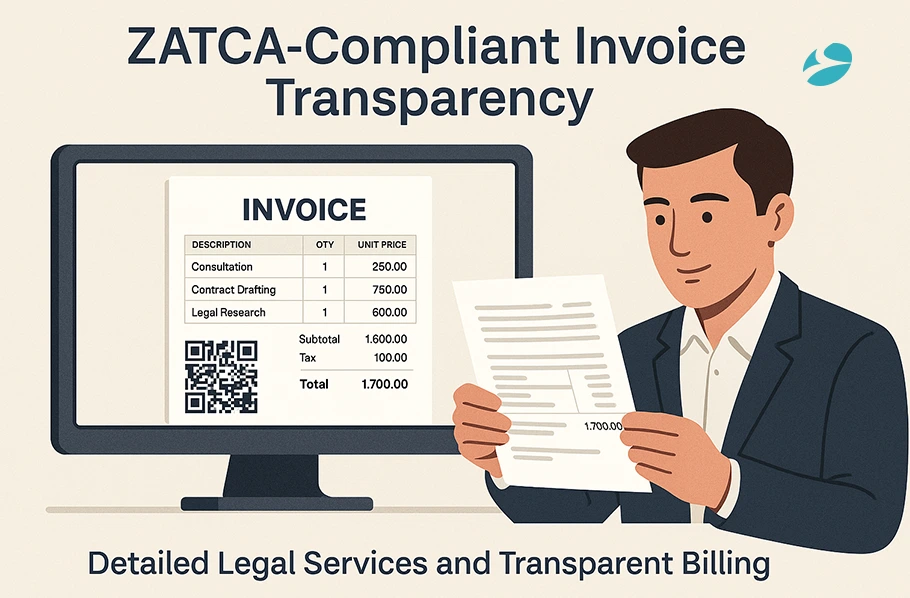
In just a matter of weeks, BiztechCS redefines what fast, measurable transformation looks like.
The transformation timeline compressed what typically takes months into focused weeks:
Week 1-2: Matter management and approval workflow deployment
Week 3-4: Document template integration and approval trail setup
Week 5-6: ZATCA invoicing connection and matter closure triggers
Week 7: Team training and workflow optimization
These results demonstrate how BiztechCS transforms operations, client service, and compliance into measurable business outcomes:
Operational Excellence:
Client Service Enhancement:
Regulatory Readiness:
Based on this engagement and similar transformations across the GCC, BiztechCS has identified critical success factors for Odoo legal workflow management:
1. Start with Pain Points, Not Technology
Every successful legal technology implementation begins with operational frustrations that affect client service. BiztechCS can show that technology follows problem identification, rather than leading it.
2. Respect Legal Hierarchy While Building Efficiency
Lawyers work within established professional hierarchies for good reasons. BiztechCS can ensure workflow systems enhance these relationships rather than circumvent them.
3. Connect Service Delivery to Business Operations
The most powerful legal workflow improvements create new connections between excellent client service and sustainable business operations—a principle BiztechCS applies to every engagement.
Odoo Consultant Tip: Post-deployment, schedule quarterly workflow audits in Odoo. These audits highlight bottlenecks, underused modules, and evolving compliance gaps—allowing firms to continuously refine workflows rather than waiting for breakdowns to occur.
This transformation reflects broader trends reshaping legal practice across Saudi Arabia and the broader Middle East region. Studies show that automation technologies can help attorneys automate up to 23% of their tasks—and paralegals as much as 69%—unlocking nearly $100,000 in additional annual billable time per attorney (jdsupra.com).
At the same time, firms adopting bespoke workflow management platforms have reported a 30% reduction in administrative expenses within the first year (moldstud.com). And across the global legal market, more than 70% of firms and legal departments are already leveraging technology solutions to streamline operations and elevate client service (docketwise.com).
BiztechCS has consistently observed this pattern: the legal industry’s digital transformation isn’t about replacing lawyers with technology—it’s about freeing exceptional legal minds from administrative burdens, enabling them to focus on what they do best: solving complex problems for valued clients.
The Kingdom’s Vision 2030 initiatives are driving unprecedented demand for sophisticated legal services while simultaneously raising expectations for operational transparency and efficiency. Firms that master this balance—maintaining personal relationships while delivering systematic excellence—will define the future of legal practice in the region.
This evolution prompted BiztechCS to ask every legal leader we meet: “How is your firm preparing for a legal landscape that demands both traditional relationship excellence and modern operational transparency?”
Unlock the potential of your legal practice by streamlining operations, enhancing client service, and ensuring compliance with seamless, integrated workflows.
Every legal firm has unique operational fingerprints—specific client types, service delivery approaches, regulatory requirements, and partnership dynamics. BiztechCS doesn’t believe in one-size-fits-all solutions.
Our Odoo legal consultancy services methodology,
Whether you’re a solo practitioner drowning in administrative tasks or a multi-partner firm struggling with workflow coordination, the principles demonstrated in this case study can be adapted to your unique circumstances.
Questions to Consider,
From initial client contact to final invoice, BiztechCS builds systems that protect and enhance your practice. We understand that legal excellence can’t be automated—but administrative excellence can be systematized.
Ready to discover how integrated workflows could transform your legal practice? Contact BiztechCS today for a confidential consultation about your firm’s unique transformation opportunities.
All product and company names are trademarks™, registered® or copyright© trademarks of their respective holders. Use of them does not imply any affiliation with or endorsement by them.

Artificial Intelligence (AI)
254
By Nandeep Barochiya
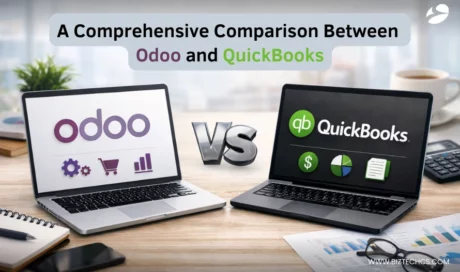
Odoo
300
By Uttam Jain

Artificial Intelligence (AI)
566
By Nandeep Barochiya